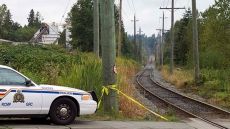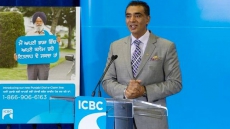PRINCE RUPERT, B.C. — Construction of the Prince Rupert ferry terminal on British Columbia's West Coast has become tangled in Buy America provisions, meaning the facility that sits on Canadian Crown land must be built with U.S. iron and steel.
A request for proposals from the State of Alaska carefully spells out that the project — estimated to cost as much as US$15 million — must be built under the American legislation.
A new terminal was part of an agreement in a 50-year lease signed in 2013 between the Prince Rupert Port Authority and the Alaska Department of Highways, which operates the ferry between Prince Rupert and Alaska.
Jeremy Woodrow, a spokesman for the Alaska Marine Highway, said his department anticipated the "conundrum" of building under the Buy America policies on Canadian land and carefully worded the request with international contractors in mind.
"We normally don't list in our (request for proposals) that this is a requirement when we're building transportation projects in the U.S. because it's a well know requirement," he said, adding that the cost of American steel would have to be factored in by Canadian contractors.
"So it's a really interesting project, in the fact that we have — what is essentially a U.S. ferry terminal being built on Canadian land or Canadian waters."
Because the funding comes from the U.S. Federal Highway Administration, the contact must comply with the rules, Woodrow said.
Michael Gurney, manager of corporate communications at the Prince Rupert Port Authority, said in an interview that the lease agreement didn't make any restrictions on the construction of the terminal and the port has no control or responsibility for the terminal.
"When it comes to the Alaska ferry terminal in Prince Rupert, it is owned, operated and used exclusively by the Alaska Marine Highway system. The lands on which it sits are leased from the port authority and that lease actually contains no provisions related to procurement."
The Alaska Marine Highway has been operating from the current facility since 1963.
International Trade Minister Ed Fast said he is deeply concerned about the restrictions on the Prince Rupert construction project.
"Taxpayers on both sides of the border would benefit from dismantling the trade barriers and inefficiencies created by U.S. protectionist policies such as Buy America," Fast said in a statement to The Canadian Press. "We are exploring all options to address this situation."
Fast said the situation, coming so quickly over the debacle with the bridge in Morrison, Colo., is another example of how illogical and counterproductive it is to try to segregate our economies.
The U.S. government reversed a decision in October, saying it wouldn't force the small Colorado town of Morrison to take apart a bridge that had been built with a small amount of American steel manufactured in a Canadian plant.
"The extraterritorial application of these protectionist restrictions on trade within Canada by a foreign government is unreasonable," said Fast.
Marcus Ewert-Johns, of the group Canadian Manufactures and Exporters, said the Buy America provisions mean more barriers are being built around what was supposed to be free trade between Canada and the U.S.
He suggests governments in Canada should impose similar policies to help manufacturers at home.
Ewert-Johns said the irony of the situation isn't lost on his group.
"So the U.S. is enforcing restrictive trade policies on a project. Yes it's their money, it's their terminal, but it's a terminal that exists in Canada on Canadian federal government land. It's a sour pill to have to swallow if you can't do anything about it."
The request for proposals closes on Dec. 4 and work is expected to be complete by March 2016.





